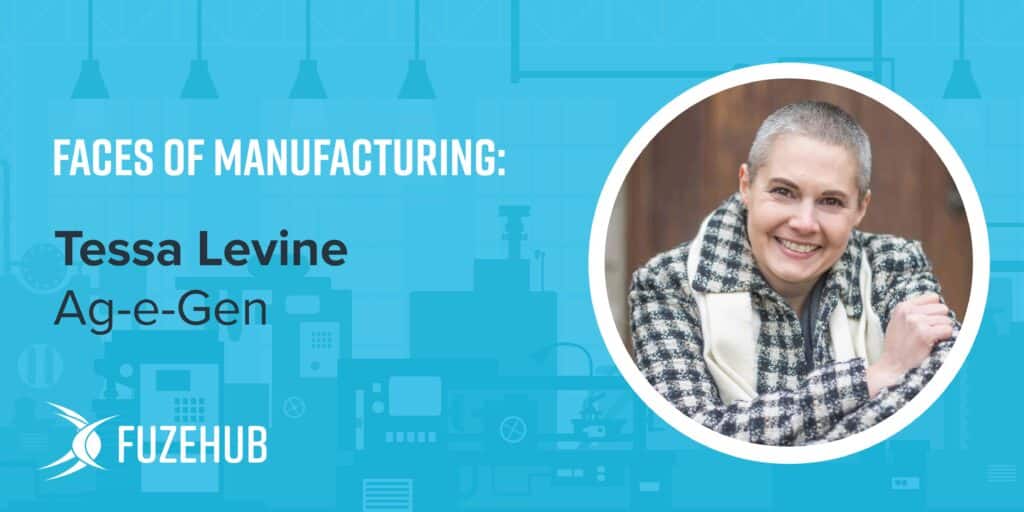Theresa (Tessa) Levine is passionate about producing practical, easy-to-implement solutions that will strengthen rural economies, improve food security, and fight global climate change. She isn’t a farmer or an engineer, but she’s guiding the Ag-e-Gen family of companies, based in Binghamton, New York, in tackling the pungent problem of manure. The Farmer’s Log, a wholly owned Ag-e-Gen subsidiary, is so-named in a cheeky nod to its feedstock and is developing mobile equipment that converts manure and other biowaste into custom fertilizers, biochar, livestock bedding, and potting soil that farmers can leverage into cost savings and added revenues.
“Once we have production up and running,” Tessa says, “we have big plans.”
A Non-Conventional Career Path
Tessa grew up in Orange County, New York until her family relocated to the greater Philadelphia area, where she attended high school and then college. As an undergraduate, she networked her way into a human resources job with a Fortune 500 company, where she worked for six years. A Fortune 100 company recruited and hired her into its informal HR executive leadership training track, where Tessa realized her passion for business and employment law. The company created an Employment Law Specialist role for her in its legal department, and she supported attorneys and HR functions by day and attended Widener University, Delaware School of Law at night.
Tessa graduated from Widener Law in 2013 and was admitted to the New York and Massachusetts bars. She helped domestic violence survivors in Boston, then took an eight-month sabbatical in Israel. When she returned to the U.S., Tessa was recruited by an international law firm to work with a former judge opening its Binghamton office. Her non-traditional career includes a stint as a Confidential Law Clerk to a Supreme Court Justice before she founded The Law Office of Theresa M Levine, P.C., where her practice includes advising small business owners on business and employment law issues, litigation, and ending domestic violence. She describes her move to the Southern Tier as “one of the greatest strokes of fortune” in her life and continues to “love the Binghamton area for its welcomeness.”
Tessa’s law firm connected her closely with the local startup community. Eric Krohn, Director of Business Incubation Programming at the Koffman Southern Tier Incubator, occasionally offers what Tessa calls “less traditional business referrals” to her firm. One such referral was the founder of eHempHouse Corp (now doing business as Ag-e-Gen under Tessa’s leadership). Andrew “Andy” Neal, now Chief Technology Officer (CTO), recruited Tessa for the company’s Chief Executive Officer (CEO) position. Andy holds several patents for energy-efficient inventions and has two approved patent control treaty (PCT) applications covering his work with Ag-e-Gen. Tessa says she enjoys being “surrounded by brilliant people” and advises that “you have to not be afraid to join in.”
Leveraging University Assets
As part of Ag-e-Gen’s growth strategy, Tessa has forged connections with several prestigious universities, including Cornell, Columbia, and Clarkson. The NYS Center of Excellence for Food and Agriculture at Cornell AgriTech Center, through its Executive Director, Cathy Young, introduced Tessa to Daniela Vergara, Ph.D., who now holds a seat on Ag-e-Gen’s board of advisors and brings a background in Genomics, Statistics, and Evolutionary Biology that have been a huge asset to the growing company. Columbia University’s Executives in Residence (EIR) program connected Tessa with Joe Dickson, a seasoned executive with a background in clean energy and the dairy industry. Joe’s connection with Barbland Dairy in Fabius, New York has created an opportunity for the company to field test and demonstrate The Farmer’s Log.
Turning Waste into Value
Today, Ag-e-Gen is developing the world’s first mobile biological waste-to-biochar conversion system. Biochar, a human-made carbon that is similar to charcoal, is produced by pyrolyzing (oxygen-deprived, high-heat combustion) organic waste. Biochar sequesters carbon, which can be incorporated into the soil to multiple advantages. Carbon sequestration, the process of capturing and storing carbon dioxide, is cited by the U.S. Geologic Survey (USGS) as a way to reduce global climate change, and soils that are enriched with biochar support the healthy colonization of beneficial microbes. In turn, this supports plant health and helps to prevent runoff that can cause algae blooms. Healthy soil also offers increased nutrient bioavailability to crops and keeps water in the ground and available to root systems instead of running off.
Ag-e-Gen is also talking to food waste companies and piloting a program to convert hemp waste into what Tessa calls “green oil.” This liquid isn’t digestible, but Tessa believes chlorophyll, the green pigment in plants that makes it difficult for humans to digest, can be filtered to produce what she calls “full-spectrum cannabinoids without any chemical processing.” Cannabinoids are a class of chemical compounds that include cannabidiol (CBD), which medical studies suggest can be used to reduce pain and inflammation. From cows to crops to CBD, the Ag-e-Gen family of companies is getting ready for great things under Tessa’s leadership.


1 thought on “Faces of Manufacturing: Tessa Levine of Ag-e-Gen”
an amazing, important and significant project